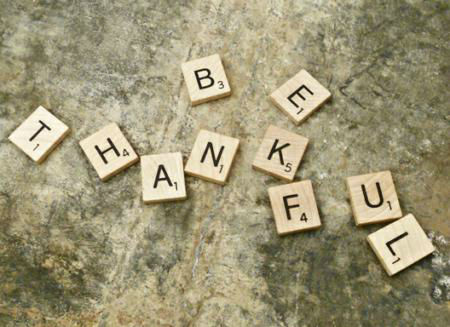Gratitude as the essence of religion
As the Thanksgiving season spills over into Advent and Christmas, many people find themselves remarking that this is their favorite time of the year.
Thanksgiving Day is, of course, a secular feast day. Christmas is not. And most of those who speak of "the holidays" as a not-so-artful dodge around the need to use the word "Christmas" -- which is indeed a holy day -- seem to be oblivious to the fact that "holiday" derives its very meaning from the word "holy."
Thanksgiving, in full secular splendor, is more than welcome in my religious lexicon. If I were pressed to reduce the entire meaning of religion to one word, that word would be gratitude. The case for making that one word love instead of gratitude is worth attempting, but I recall learning that it was God who first loved us, thus enabling us to love and therefore all we can be is grateful. Why? Because God first loved us, he graced us.
I am also fond of reminding anyone who cares to listen that the old American vernacular used to express gratitude was "much obliged." Obligation under God springs from a sense of gratitude. If you acknowledge gratitude as your rightful stance before God, you can begin to notice the presence of moral obligation in yourself to do or not do certain things that God wants you to do or avoid.
Catholics speak of their Sunday "obligation" without giving much thought to the notion of gratitude being in any way associated with obligation, and they give even less thought to the fact that Eucharist -- what they celebrate when they gather on Sundays to remember their Lord in the breaking of the bread --means thanks-giving, thanks-saying, thanks-doing. As I said, central to and at the bottom of the meaning of religion, in my book, is gratitude.
You don't have to go very far into survey research to discover that nobody likes an ingrate. We observe that as children. As adults, however, we often fail to measure ourselves on the gratitude scale. Success and security can make ingrates of us all. That's more than a bit strange, but true nonetheless. Perhaps it says something about self and selfishness, or it may simply be spelling out a little lesson in human nature, which does have an insular, self-enclosing, self-interested tendency. That may relate to the survival instinct.
But human nature is also social, relational, outward-reaching, and needing to link and bond in the quest for happiness. Human nature may not be inclined naturally to share, but it would be an error to conclude that sharing is unnatural when human happiness depends on it. So we have to learn to share. And we learn that through the development of our sense of gratitude.
As Thanksgiving moves toward Christmas, take a moment to assess your position on the gratitude scale. The closer you are to open and generous sharing, the clearer the signal you are sending to others that gratitude is driving your decisions. And that's exactly as it ought to be.
FATHER BYRON IS A COLUMNIST WITH THE CATHOLIC NEWS SERVICE.
- Father Byron is a columnist with the Catholic News Service.



















